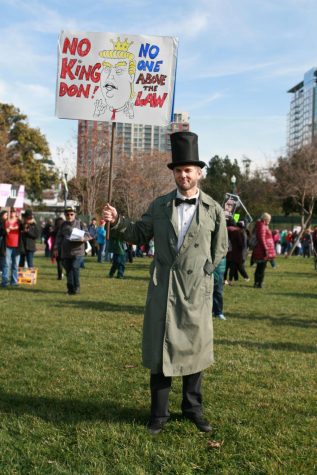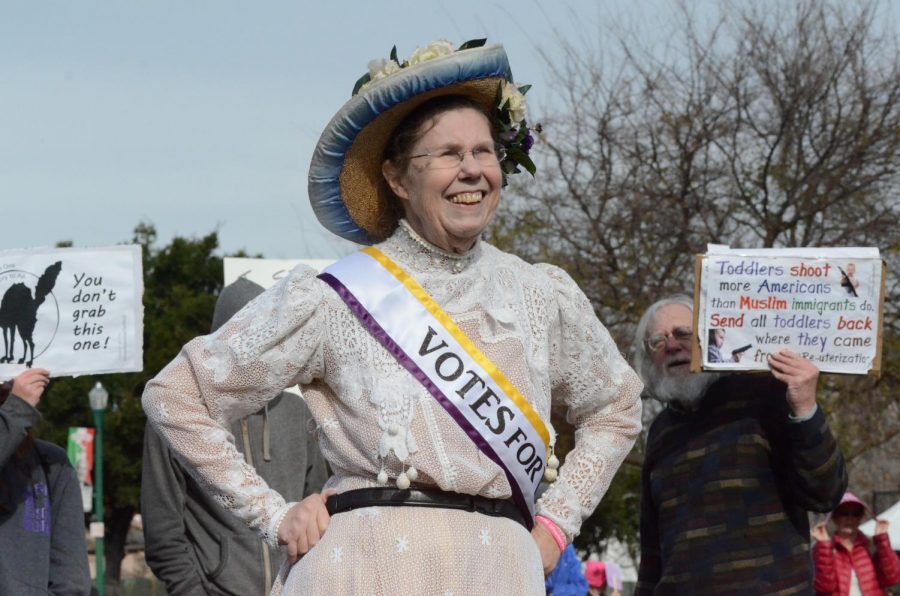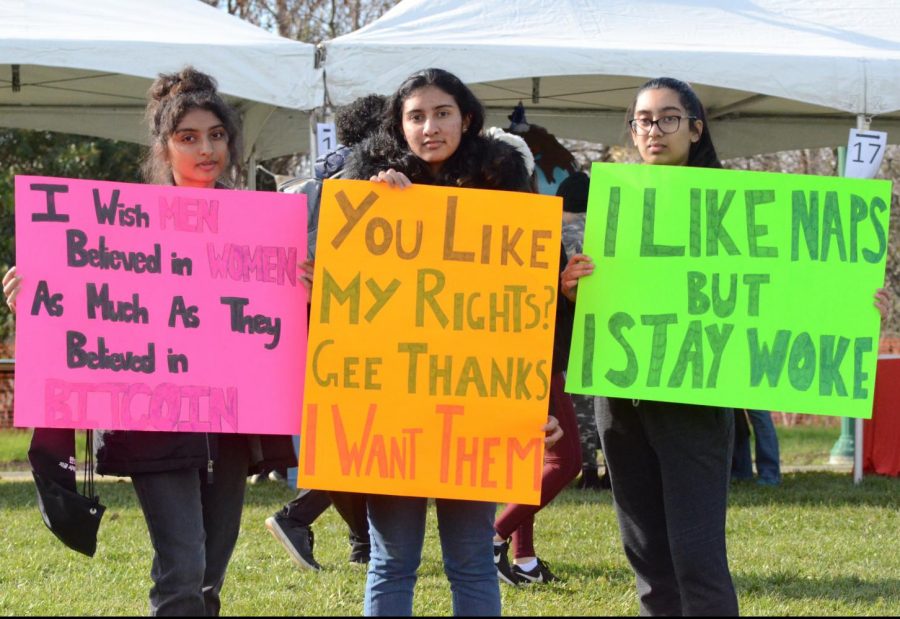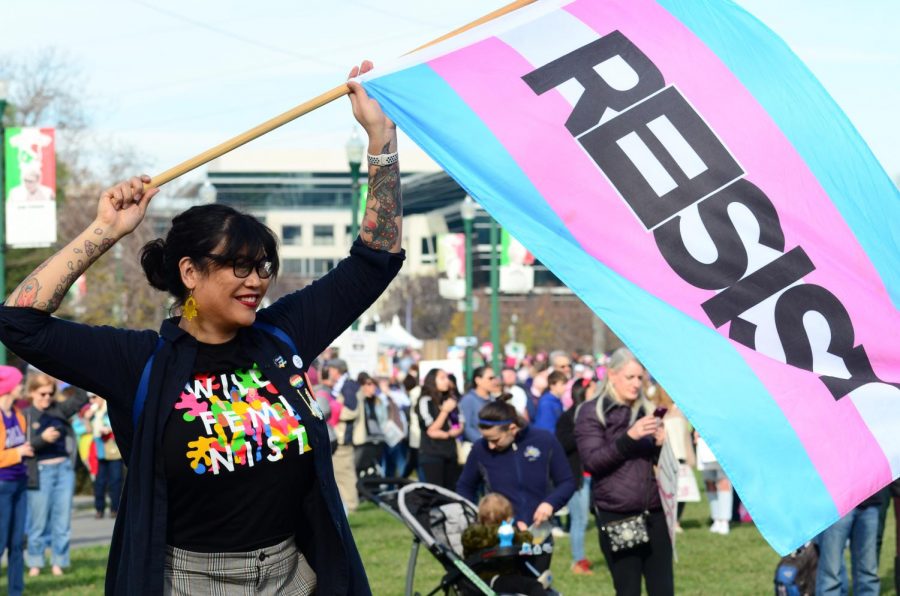Striving for social justice
Upper school students join thousands gathered at the San Jose Women’s March, tackling a variety of social issues
January 21, 2020
“Show me what democracy looks like!”
Behind the banner emblazoned with “Women’s March 2020,” loudspeakers blared from the event’s organizers as they led the enthusiastic protestors in a resounding chant. The crowd, spanning all generations, waved cardboard signs, filled the entire breadth of the street and chorused in response: “This is what democracy looks like!”
Over 7,500 protestors turned out last Saturday for the fourth annual Women’s March in San Jose, according to the march’s organizers. The march started at 11 a.m. at San Jose City Hall and proceeded to Arena Green, with protestors chanting and waving flags along the way.
Speakers included a member of the Amah Mutsun tribe; Karrington Kenney, a junior at Milpitas High School; students from the Silicon Valley Youth Climate Strike; Veronica Culpepper, a member of the LGBTQ+ community; writer and artist Rosanna Alvarez; author and keynote speaker Shareen Rivera; founder and president of Lean In Latinas Anna Dapelo-Garcia and Diane Fisher, a director at the Jewish Federation of Silicon Valley.
The march consisted of protestors promoting causes from impeachment to climate change yet all united under the umbrella of women’s rights. Dressed in purple T-shirts, members of the Service Employees International Union (SEIU), a labor union of around 2 million workers, 70 percent of whom are women, that rallies for economic and racial justice. Peter Eriksson, who has been a member of the SEIU for 25 years and works as a negotiator, promoted wage equity.
“Some of the [women] are the lowest wagers,” said Eriksson. “We need equity; we’re here for equity, which means everyone should get a decent wage. Right now, the country is not offering a decent wage.”
Nikhita “Niki” Karra (12), who attended the march, was frustrated at the necessity of a march to lobby for women’s rights, but appreciated the effort and hopes that equal rights will soon be achieved for all.
“I’m mad, and I think a lot of people here are really, really mad. It’s been 100 years since women got the vote, and that’s white women, but still, that’s insane that we’re here in the 21st century and we still have to be doing this. That’s messed up,” Niki said. “But I think that’s the goal—to not be doing these anymore. We shouldn’t be having to do these anymore, and I think that’s going to be happening pretty soon, at least hopefully.”
Karrington, a 16-year old student speaker from Milpitas High School who was inspired to speak out after a blackface incident at her school, underscored the continuing racial bigotry against African American citizens, emphasizing in her speech that “we don’t have to be the trouble to be in trouble.”
She pushed for greater recognition of African American people’s culture and achievements, such as Frederick Jones, who invented the mobile refrigerator, and Katherine Johnson, Dorothy Vaughan and Mary Jackson, the three female “hidden figures” who were mathematicians and engineers for NASA whose work was critical for launching American astronaut John Glenn into orbit for the first time.
“I don’t stand for injustice,” Karrington said. “It does not have to be against the black community, just against anyone, because I know what it is like to be on the other side of that, so seeing it happen to anyone, I’ll be the first one to speak about it.”
Besides Karrington, student speakers included members of the Silicon Valley Youth Climate Strike, who led a protest for environmental reform last September.
“Women’s rights are a huge part in being intersectional in the fight for climate justice, so when we were given the opportunity to speak up here and be on stage, we really wanted to take advantage of that and also contribute to the conversation about making our power count,” Helen Deng, the co-director of Silicon Valley Climate Strike and a junior at Archbishop Mitty High School, said.
Another environment-focused movement present at the rally was Extinction Rebellion South Bay, one of the newer chapters of the Extinction Rebellion movement, members of which Harker Aquila interviewed last November during their hunger strike in House Speaker Nancy Pelosi’s Longworth office.
“We really know that this is an intersectional issue—the people most affected by climate change are underserved communities, people of color and women, and indigenous peoples, so [there] is a lot of overlap here,” Leah Jay, a member of Extinction Rebellion South Bay from San Jose, said.
Nicholas Kuwada, the Director of the Santa Clara County Office of the Census, was among the speakers and urged women to participate in the decennial survey to make their voice heard. His voice rang out from the stage as an adjacent screen displayed his movements.
“I cannot tell you how strong our community is, how much better our community is, with the women in it. We have so many women in our community — strong women and proud women — and they are our leaders and our trusted messengers,” Kuwada said. “Women need to come together and show our federal government that they are important [by filling out the Census.] They deserve to be seen. The Census is the first step—I would say it’s even more important than voting.”
Advocating for women’s rights from a different perspective was speaker Veronica Culpepper, a trans woman from San Jose who represented the LGBTQ+ community and International Trans Fund (ITF). She cited instances of job discrimation against members of the LGBTQ+ community, encouraging the crowd to instead build connections.
“[I am] really trying to encourage people to reach out and find ways to align with alliances to change the story,” Culpepper said. “This year we have to push the Senate out, we need to reform the Senate, and we have to push the president out. We got to make those changes.”
Aside from the speakers at the center stage, many organizations took the opportunity to promote their causes at nearby booths in the “Call to Action Alley,” rows of white tents that ran along the lawn of Arena Green. Each organization was staffed with members who hung out banners and greeted passerby.
Among the organizations present were the American Civil Liberties Union, the Womens’ International League for Peace and Freedom and the Santa Clara County Office of Women’s Policy. Volunteers at the booths promoted their causes, recruited more volunteers and educated young voters about various issues, including voting and LGBTQ+ rights.

Los Gatos native David Folker arrives to the San Jose Women’s March rally as former President Abraham Lincoln, “one of the last good Republicans,” to draw support for the democracy and encourage others to vote.
“The best thing I can say [to teenagers] is to know who you’re voting for,” Kristin Rivers, a teacher for the Santa Clara County Office of Education from the booth for the Enough is Enough Voting Project, said. “Look at the voting record, ask around and if you don’t have the time to read everything, then the type of organizations that are endorsing the candidates can tell you a lot.”
Many protestors dressed up for the rally as historical figures to bring their own perspectives to the current time period. Los Gatos native David Folker came as former President Abraham Lincoln, “one of the last good Republicans,” to draw support for the democracy and encourage others to vote. Jane Beckman from San Jose, who has attended every Women’s March since 2017, donned a traditional suffragette costume to recall a crucial turning point in women’s rights in 1920, when the 19th Amendment gave women the right to vote.
“We started fighting for women’s rights in 1848,” Beckman said. “We’re still fighting, but it’s a hundred years since we got the right to vote, and I honor all my relatives, and the women who came before, by going out and making sure my voice is heard.”
Marching amongst other protestors, Nikki Solanki (12) was inspired by the action her community was taking as well as the power behind the moment, bestowing her with hope for the future.
“I think our generation knows what it takes to make change…it was crazy to see people our age so politically aware,” Solanki said. “Just the nature of our generation is so much different than the generations before us, and I think that we want to make a change, and we see that it’s time. I definitely think our generation is the one that’s going to do it.”

Jane Beckman from San Jose, who has attended every Women’s March since 2017, poses in a traditional suffragette costume at the San Jose Women’s March to recall a crucial turning point in women’s rights in 1920, when the 19th Amendment gave women the right to vote. “It’s a hundred years since we got the right to vote, and I honor all my relatives, and the women who came before, by going out and making sure my voice is heard,” Beckman said.

